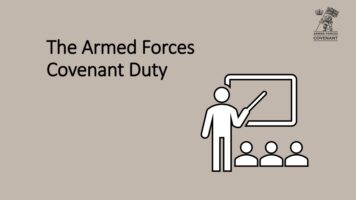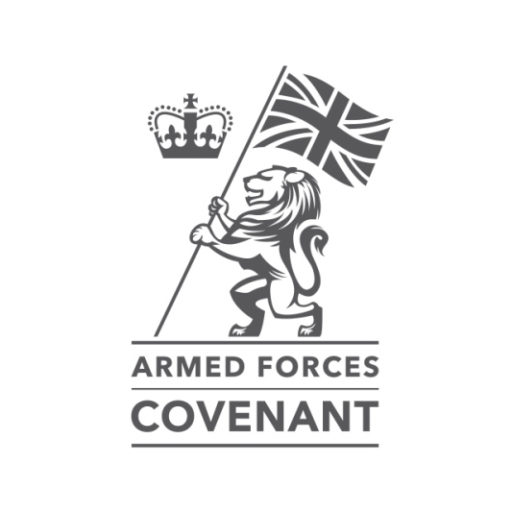Covenant support for Service families: Education
In education, Covenant support for Service families includes the following:
“My child’s school needs extra funding to mitigate the impacts of Service life”
The Service Pupil Premium provides extra funding to state schools, free schools and academies attended by Service children in England. The Department for Education introduced the Service Pupil Premium in April 2011 in recognition of the specific challenges children from Service families face and as part of the commitment to delivering the Armed Forces Covenant.
The MOD Education Support Fund is open to publicly-funded schools, academies and free schools in the UK attended by Service children whose parents are subject to exceptional mobility and/or deployment.

“My child’s move between schools wasn’t managed well, as the new school didn’t know he’s a Service child”
In collaboration between the Department for Education and the Ministry of Defence, there have been changes to the Common Transfer File (CTF) from September 2018. The CTF is the means by which state schools and local authorities in England transfer pupil data when a pupil moves from one school to another. From September 2018:
- When a school receives a CTF with the Service Child flag indicator set to ‘Yes’, an alert will be raised asking that a) the appropriate member of staff be informed of the identity of the Service child joining the school and b) where the concerns section in the ‘Service Child’ section of the CTF has not been completed, that the appropriate member of staff be informed and advised to contact the CTF sending school for clarification.
- A ‘Service Child’ section has been added to the CTF that asks additional questions based around a child’s response to moving school, parental deployment and parental separation due to extended training periods or other forms of duty. A free text box has also been added in which a school can include details about any concerns, gaps in education, strengths of the child, etc.
These developments are designed to help schools manage the transfer of Service children and ensure a greater continuity of education and pastoral support.
School admissions is one of the areas covered by the Covenant Legal Duty. To find out more, see section 3C of the Legal Duty statutory guidance.
“The Armed Forces are re-locating us, but my child hasn’t been allocated a school place in our new location as we don’t live there yet”
Video used with permission of the BFBS.
The School Admissions Codes for England and Wales both include requirements relating to children of Service personnel. The Code for England requires local authorities to ensure that ‘arrangements in their area support the Government’s commitment to removing disadvantage for service children’. Both Codes require admission authorities to allocate a school place to a Service child in advance of the family moving to the area (as long as one is available), provided the application is accompanied by an official letter that declares a re-location date. Where requested by the parent, admission authorities are able to use a unit or quartering address (or, in England, a private address) as the child’s home address when considering an application. The Code for England allows priority in oversubscription criteria to be given to children eligible for the Service Pupil Premium.
In addition, if returning from overseas, you can apply for school places for your children in advance.
School admissions is one of the areas covered by the Covenant Legal Duty. To find out more, see section 3C of the Legal Duty statutory guidance.
News story: Help for Armed Forces families to become school admissions savvy
 “My child has a longer journey to school because the Armed Forces re-located us in the middle of the academic year, and all the schools close to our new home were already full”
“My child has a longer journey to school because the Armed Forces re-located us in the middle of the academic year, and all the schools close to our new home were already full”
This might be mitigated through the normal application of the free school transport policy – the Service child might meet the eligibility criteria for free school transport in England, Wales, Scotland, and N Ireland. Bodies responsible for home to school transport may also wish to consider using their discretionary powers to provide free or subsidised transport to Service children who do not meet the eligibility criteria.
In 2015, the (then-named) Local Government Ombudsman upheld a complaint about a council in England discontinuing school transport for a Service child after the family was required to move elsewhere in the area for Service reasons. One of the Ombudsman’s findings was that the council had not properly considered the Armed Forces Covenant.
Both School Admissions Codes for England and Wales allow exceptions to infant class size limits for children of Service personnel admitted outside the normal admissions round.
Transport to and from school is one of the areas covered by the Covenant Legal Duty. To find out more, see section 3F of the Legal Duty statutory guidance.
“We can’t take a family holiday during normal school holiday periods because the Armed Forces need me to work”
As with all children, the decision on whether to authorise term-time holidays for Service children sits solely with the head teacher of the school. While the educational needs of the Service child will always be a critical factor, the wider family impacts should also be considered. It is for Service families to apply to the school in advance, presenting evidence of how operational needs of the Armed Forces have legitimately prevented a Service family from taking holiday during normal school holiday periods.
In the past, head teachers have sought advice on applications for school absence from Unit Commanding Officers and their Welfare staff, who are able to provide advice, verification and endorsement as required. MOD has produced Guidance that provides advice to head teachers regarding school term-time absence for Service children. It includes contact details that can be used if head teachers are unsure how to make contact with the relevant Armed Forces unit.
Attendance at school is one of the areas covered by the Covenant Legal Duty. To find out more, see section 3G of the Legal Duty statutory guidance.
“Our child isn’t eligible for undergraduate student finance, as we’ve been living abroad on an overseas posting”
The Education (Student Support) Regulations 2011 (schedule 1), which apply to England and Wales, recognise that members of the regular Navy, Army and RAF serving outside the UK, and their children, are to be treated as ordinarily resident in the UK, for these purposes. This is also reflected in Student Finance Wales’ Assessing Eligibility guidance.
The Student Awards Agency Scotland’s residence conditions also recognise that Armed Forces families might be posted outside of Scotland.
Wider sources of information
- For further information, please see the MOD’s Guidance on education in the UK for service children and Guidance on education overseas for service children.
- A leaflet explains the role of the Children’s Education Advisory Service. Enquiries should be addressed to DCYP-CEAS-Enquiries@mod.gov.uk.
- There is a dedicated website for Supporting Service Children in Education in Wales.



